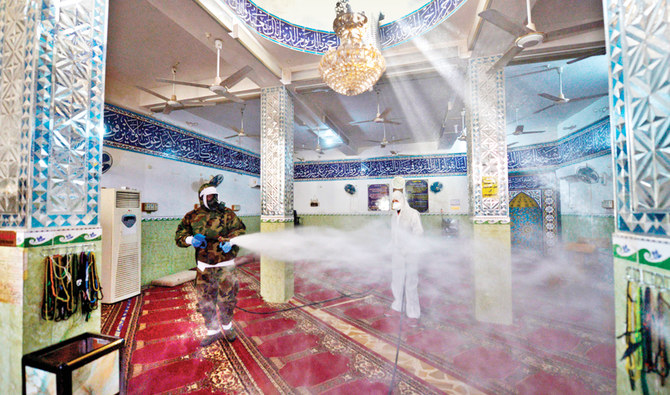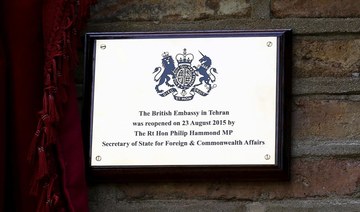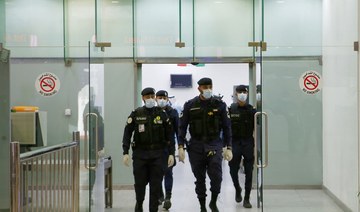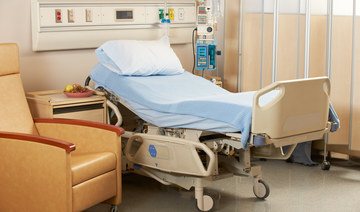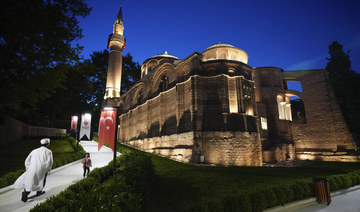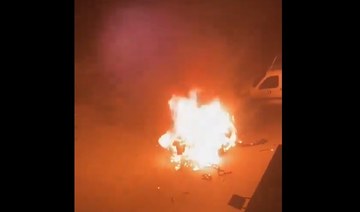DUBAI, TEHRAN: Major concerts and events in the UAE, an air transit center as well as a tourism and business hub, have been canceled or postponed as the coronavirus spreads in the Gulf.
There have been at least 1,641 cases of the virus in the Gulf region, mostly in Iran where 66 people have died. Cases have also been reported in other Middle East nations.
The March 5-6 electronic music Ultra festival at Abu Dhabi’s 25,000-capacity Du arena and the March 21 K-pop concert Music Bank at Dubai’s 17,000-capacity Coca-Cola Arena have been canceled.
Organizers of Ultra, where electronic group Major Lazer and DJ Afrojack were to perform, cited travel restrictions imposed by some countries and airlines due to the rapidly spreading virus.
South Korea’s national broadcaster KBS and crowdfunding platform Makestar, organizers of the K-pop concert, said Music Bank was canceled because of the spread of the epidemic in South Korea and elsewhere.

Dubai’s flagship international art fair “Art Dubai,” which was scheduled to be held from March 25-28, has also been postponed, organizers said.
The UAE, which has reported 21 cases of coronavirus, regularly hosts major conferences, concerts and sporting events, a significant draw-card for foreign visitors.
The UAE central bank will reassess its forecast for economic growth in 2020 due to the coronavirus outbreak, an official said on Tuesday. A women’s forum and yoga festival in Abu Dhabi and a carnival in Dubai for the Hindu holi festival, all in March, have also been canceled or rescheduled.
American rapper and producer Russ said his March 27 concert in Dubai will now take place in November because of the virus.
“I know, wild lol (laugh out loud) but outta my control,” he said on Twitter.
Dubai has postponed its March boat show until November and Abu Dhabi postponed the ITU World Triathlon event this month, after earlier canceling a cycling event in which two riders were diagnosed with the virus.
Meanwhile, the Middle East’s largest airline, Emirates, said it had to reduce or ground flights due to the new virus. Because of the slowdown, the government-owned carrier has asked its employees to take paid and even unpaid leave for up to a month at a time. Emirates’ operates out of Dubai, the world’s busiest for international travel.
HIGHLIGHT
Experts worry Iran’s percentage of deaths to infections, now around 3.3%, is much higher than other countries, suggesting the number of infections in Iran may be far greater than current figures show.
Qatar has canceled a defense exhibition and Bahrain has postponed two oil and gas conferences that had been scheduled to take place this month.
The March 16-18 Doha International Maritime Defense Exhibition and Conference (Dimdex) was scheduled to take place at the city’s exhibition center DECC.
Doha has recorded a new case of coronavirus, a Qatari national who was among a group evacuated from Iran on Feb. 27. This brings the number of infections in Qatar to eight.
Iran’s supreme leader has put the country on war footing against the coronavirus, known as COVID-19, by ordering its armed forces to assist health officials in combating the outbreak — the deadliest outside of China — that authorities say has killed 77 people.
Experts worry Iran’s percentage of deaths to infections, now around 3.3%, is much higher than other countries, suggesting the number of infections in Iran may be far greater than current figures show.
Iran stands alone in how the virus has affected its government, even compared to hard-hit China, the epicenter of the outbreak.
The death of Expediency Council member Mohammad Mirmohammadi on Monday makes him the highest-ranking official within Iran’s leadership to be killed by the virus. State media referred to him as a confidant of Khamenei.
The virus earlier killed Hadi Khosroshahi, Iran’s former ambassador to the Vatican, as well as a recently elected member of parliament.
Those sick include Vice President Masoumeh Ebtekar, better known as “Sister Mary,” the English-speaking spokeswoman for the students who seized the US Embassy in Tehran in 1979 and sparked the 444-day hostage crisis, state media reported. Also sick is Iraj Harirchi, the head of an Iranian government task force on the coronavirus who tried to downplay the virus before falling ill.
On Tuesday, lawmaker Abdolreza Mesri told Iranian state television’s Young Journalists Club program that 23 members of parliament had the coronavirus. He urged all lawmakers to avoid the public.
“These people have a close relationship with the people and they carry different viruses from different parts of the country, which may create a new virus, so we recommend the lawmakers to cut off their relationship with the public for now,” Mesri said.
An activist group also said that Wikipedia’s Farsi-language website appeared to be disrupted in Iran after a close confidant to the supreme leader died of the new coronavirus.



